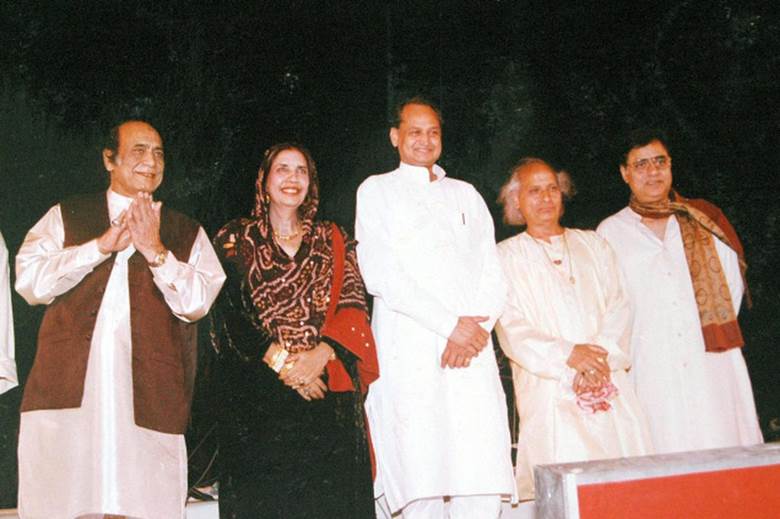
In this 2002 photo ghazal maestro Mehdi Hassan is seen with Chief Minister Ashok Gehlot and other artists of Rajasthani-origin at the International Rajasthani Conclave in Jaipur – The Hindu
The First Word in Ghazals, the Last Note in Silence
By Siraj Khan
Boston

It was 1978. The Rajasthan government had honored Mehdi Hasan with the status of a state guest. The arrangement included his performance at a ghazal program in Jaipur - home of Mehdi Hasan's native village and birthplace Luna. The maestro wanted to visit Luna before the program, for the first time since he left it after Partition.
During the bumpy ride there, he suddenly asked the driver to stop the car. His travel companions were rather surprised. He got out of the car and started to walk towards a small temple located not far from the road, then flung himself on the ground, weeping like a child. After regaining his composure and returning to the car, Mehdi Hasan informed the others that, as a child, he used to sing bhajans in that temple.
The next day, Mehdi Hasan performed before a selected audience at the scheduled ghazal program in Jaipur. That was followed by a dinner hosted in his honor by the Governor of Jaipur. During the dinner, Mehdi Hasan remarked upon lack of a proper paved road leading to his village and lack of electrical facilities in the area.
Well, the electricity was provided in three days. The roadwork would need more time and funds, but a promise was made that it would be done. In order to expedite the process and ignite the torch himself, Mehdi Hasan decided to perform before a larger audience of the Jhunjhunu district. No less than two hundred thousand people attended the event. All proceeds from the show were allocated for the road paving. Access to Luna today is not only easier, it is also more welcoming, thanks to the maestro, a true son of the soil.
When Mehdi Hasan became seriously ill, Mohan Nath, a priest in Luna, said that the whole village was praying for Khan Sahib's total and complete recovery. "Since the time we came to know about the ill-health of Mehdi Hasan we have been very worried. We continue to hope and pray that God showers his blessings upon him and he is fine soon," Nath said.
Narayan Singh Shekhawat, another native of village Luna and also one of Mehdi Hassan's few surviving childhood friends, said that he would pray to God to give him a long life.
But perhaps it was now time for God to have His own concert too.
Mehdi Hasan was part of the era when our cultural landscape was inspiring enough to create music, films, poetry and other forms of art whose quality could encompass all tastes across the class divide. From the late-1950s to the mid-1970s, Pakistan had succeeded in creating a fine blend of high and popular culture, where artists like Noor Jahan, Iqbal Bano, Mehdi Hasan and others, could not only survive but thrive, and the nation could boast about its musical creativity, which the citizens could be proud of. However, even in the best of times, we have been confounded by the debates on whether music is haram or halal and what constitutes culture, heritage or Islam. Mehdi Hasan was above all that and continued unfazed.
From Khyber to Dhaka and from Multan to Madras, Mehdi Hasan's profound vocals today bind discerning lovers of music, who truly feel that it was a privilege in itself to be living in the same era as him. I have never referred to him as Shahenshah-e-Ghazal, simply because that seriously limits his matchless versatility and his unique contribution to music and performing arts. His film playback, his patriotic songs (apni jaan nazar karoon, ab fath-e-mubeen hai), his light classical renditions, folk par excellence, the thumris and the kafis, any one of them can give goose-bumps to any music lover, even with a rudimentary knowledge of our music and culture.
Mehdi Hasan, the man, was a great believer that poetry and music belong to the whole world, and transcend national boundaries and frontiers, making them either vanish or at least seem to not exist. He is reported to have mentioned more than once that Jo haq Pakistanion ko meri ghazlon par hai, wohi Hindustanion ko bhi hai. Unhon ne mujhe kum piar nahi diya (the right that Pakistanis have to my songs, Indians have the same rights. They have given me no less love).
Only Indian writer-poet Gulzar could have responded with something stronger than that a couple of years ago when he recited his poem for Aman ki Asha on TV:
Ankhon ko visa nahi lagta, sapnon ki sarhad nahi hoti
Band ankhon se aksar sarhad par chala jata hoon milne
Mein Mehdi Hasan se!
Rajasthan is known for its haunting melodies, connecting the earth and the soul. The echoes of the local nomads roaming its vast deserts are said to find their way into the sand dunes, the dark nights, and the shining stars.
Mehdi Hasan's voice probably still wafts around in that vastness, providing their sound of silence.
His childhood friends too have passed on but the trees, streets, wells, and fields of the village still remain, mute witness to the formative years of Mehdi Hasan.
(Siraj Khan is a Boston-based connoisseur of film music who “lives a life without boundaries”)
Back to Pakistanlink Homepage

